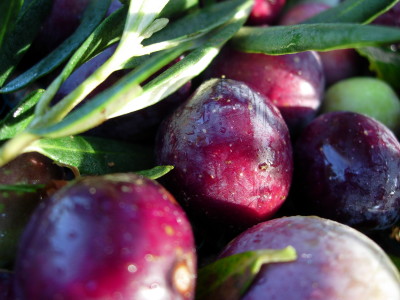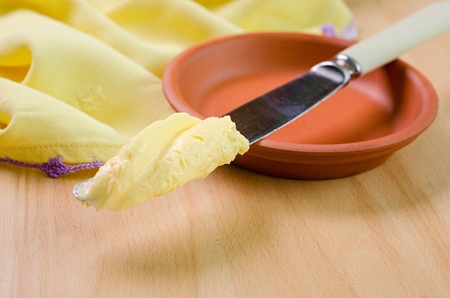HOW HEALTHY ARE BUTTER ALTERNATIVES?
By LILLIE GARCIA-SANTOS
Whether you are avoiding butter for health and weight-loss reasons, or for animal welfare reasons, boycotting butter has become a very common practice in recent years. The high level of saturated fat content in butter, at around 50%, is a major contributor to unhealthily raised cholesterol levels in your body.
Although the dairy aisle of a supermarket can look daunting to non-butter users, there are only four main alternatives to real butter in our supermarkets today: sunflower, soya and olive oil spreads, and margarines.
Most butter replacements such as margarine typically contain only 28% saturated fat and less than 1% trans fat, making them a good source of healthier fats and helping to lower blood cholesterol levels.[1]
If you are only avoiding butter for health reasons, then the milk in margarine will include calcium. Margarine spreads are available fortified with plant sterols and stanols, which may help lower cholesterol, according to MayoClinic.com.
Additionally, some margarines lower their calorie counts by whipping in water or air. Others are low in sodium, have added omega-3 fatty acids, which can help protect our arteries against free-radical damage, or have added plant sterols, which can lower our LDL, or “bad” cholesterol.
However, margarine is notorious for containing a great number of chemicals and additives that could be damaging to the body.
Nutritionist Jessica House of MyDetoxDiet.co.uk states that she doesn’t encourage her clients to use artificial butter replacements, they should in fact ‘always avoid margarine…’. Hard margarines, called stick margarines, are particularly bad, containing high amounts of trans fats. Margarine also contains omega-6 fatty acids, which the modern consumer eats too much of already because it is found in vegetable oils and many processed products.
The other more common alternative is the use of vegetable oil spreads, such as sunflower, olive and soya. These spreads commonly contain less than 40% fat compared to butter and margarine, which contain at least 80%.
 Furthermore, most avoid hydrogenating the liquid fats contained within their product. This is a benefit for the health conscious as hydrogenation (forcing hydrogen through a fat to change the shape of its fatty acid chain) is an unnatural process that has been proven to be dangerous to our health.
Furthermore, most avoid hydrogenating the liquid fats contained within their product. This is a benefit for the health conscious as hydrogenation (forcing hydrogen through a fat to change the shape of its fatty acid chain) is an unnatural process that has been proven to be dangerous to our health.
Vegetable oil spreads also, unfortunately, contain palm oil, another highly controversial ingredient. Palm oil is produced on trees that are planted after the destruction of rainforests and animal habitats. In fact palm oil plantations are one of the leading causes of rainforest destruction.
Since the fat content is not regulated in spreads, many brands will substitute water for oil. A large number of spread products are also whipped with water to decrease the calorie count – in some brands water accounts for over 40% of the product.
Jessica House encourages her clients therefore, to use alternative spreads, such as coconut butter, tahini, (sesame seed oil) and olive oils. Using olive oil instead of butter or margarine with your bread is beneficial as no chemicals are used to fortify it and olive oil has vitamin E and monounsaturated fats.
Another alternative, which I personally opt for, is coconut oil as a spread instead, as it is raw and pure and has a sweeter taste than olive oil. Pumpkinseed, peanut and almond butter are a few more alternatives that have a more appealing taste and contain the good fats a body needs.
As dietitian Shauna Lindzon jokingly states, “when it comes to calories, fat equals fat equals fat… No matter how you spread it, you’re spreading fat on your bread.” So if you can’t avoid the calories you may as well make them healthy and cruelty free.
About the Author:
Lillie Garcia-Santos is a second year student from London studying English Literature at The University of Sussex. With a passion for animals, health and the environment, Lillie is a newly converted vegan and loves it. In her future Lillie hopes to become a travel journalist and hopes one day to live in a totally eco-friendly house in London
[1] Heart Foundation http://www.heartfoundation.org.au/healthy-eating/fats/Pages/butter-margarine.aspx
